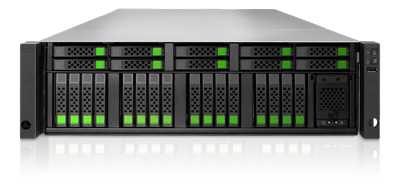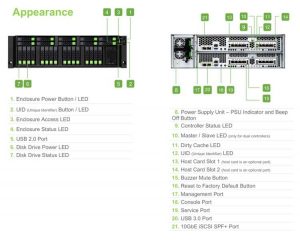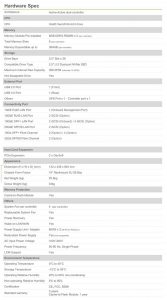Qsan XCubeFAS XF3126D 3U 26-Bays All-NVMe AFA Under $20,000
Supports 25GbE iSCSI and 32Gb FC connectivity and up to 20 ports connection, 4K random write, and achieves 220,000 IO/s at 300μs and 450,000 IO/s at 500μs latency level.
This is a Press Release edited by StorageNewsletter.com on October 19, 2020 at 2:32 pmQsan Technology Inc. launched its first all-NVMe flash storage XCubeFAS XF3126D.
XF3126D, a 3U 26 bays all-NVMe flash storage, achieves the performance requirements of the enterprise HPC infrastructures with high IO/s at μs – level latency.
XF3126D equipped with the company flash storage management system, XEVO, to deliver the potential of NVMe SSD, provides high IO/s and quick response time for demanding business applications. It is the IT solution for database, media editing, AI, IOT, virtualization, and real-time applications.
“Qsan is committed to bringing industry-leading all flash storage technology to all size of business. XF3126D offers tier-1 low latency and high IO/s data storage experience to enterprise and SMB market,” said Phil Tai, director, product management, “Customers are able to plan their budget more comfortably and enjoy the enterprise, high performance all-NVMe flash storage“.
XF3126D is designed for enterprise users, providing storage performance, enterprise-grade reliability, and a flexible management system.
Performance:
-
Supports 25GbE iSCSI and 32Gb FC connectivity and up to 20 ports connection to meet various network deployment needs.
-
IO/s with low latency, for 4K random write, XF3126D achieves 220,000 IO/s at 300μs latency level and 450,000 IO/s at 500μs latency level.
-
HA and enterprise-grade reliability
-
Dual active controllers concurrently provide storage services in real time and guarantees the non-stop storage service.
-
All of the critical components are hot pluggable and designed with redundancy.
Read also:
Next-Gen Unified Storage XCubeNXT XN8000D Series by Qsan
With 16 (3U) or 24 (4U) bays
July 10, 2020 | Press Release
Qsan XInsight for Central Storage Management
Access anywhere by any devices, single sign-on, single platform management, and unified RESTful API
January 31, 2020 | Press Release
Comments
If this entry-level 3U XF3126D product, with a maximum capacity of 400TB, is really under $20,000 for the controller box only, even without SSDs (around $140 each one on Amazon) to fill the included 26 bays, it's a bargain, as AFAs are commonly in the $100,000 and even $1 billion range for high capacity enterprise units.
Furthermore, it has good performances with 220,000 IO/s at 300μs and 450,000 IO/s at 500μs latency level, powered by Intel Xeon 64b 6-core CPU, with active-active dual controller, memory expandable up to 384GB per controller, and up to 20 ports connection (1GbE, 10GbE, 25GbE LAN, 16Gb and 32GB FC), 1xUSB 2.0 and 1xUSB 3.0 external ports, with company's flash-based storage management system XEVO.
The company stated that "data can be accessed in just 5mn when storage is installed for the first time," with the ability to analyze business usage and monitor the storage status in real time. "Moreover, external manage features such as RESTful API, SNMP and emailing notification enable managers to grasp the system status and focus on better decision making."
Warranty is 3 years but only one for cache-to-flash module.
It's not the first subsystem from Qsan with SSDs that aready announced this year its hybrid Unified Storage XCubeNXT XN8000D Series able to use HDDs as well as SSDs in up to 24 bays in 4U form factor. Also in 2018, the firm launched the XCubeFAS XF2026D 2U 26-bays all-flash SAN, and even in 2017 showcased an all-flash SAN storage system based on Seagate Nytro SSDs. But the latest one is its first AFA with 2.5-inch U.2 dual-port NVMe SSDs.
Born 15 years ago, Qsan is mainly a NAS manufacturer with cheap products, in a country, Taiwan, with several competitors there since decade, even now in AFAs like Accelstor, Infortrend, Innodisk, Promise, Qnap, RAIDON Technology/STARDOM, Synology, Thecus, UTran Technology or Wiwynn.
AFA growing market has attracted a lot of storage companies. We count 148 companies up to now into this business, with prices of subsystems and SSDs decreasing, and then being now affordable even to SMBs, and more and more replacing traditional HDD arrays.

















 Subscribe to our free daily newsletter
Subscribe to our free daily newsletter

